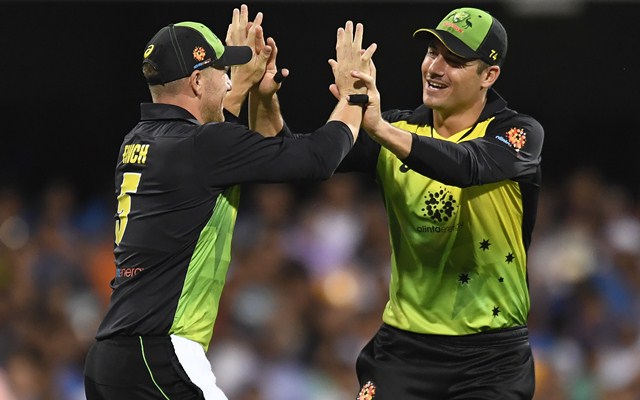5 Strangest instances of a team losing in International Cricket

A variety of existing rules in cricket has seen a team losing despite putting as good performance as the winning team if not better. Scoring more than the opponent or picking up more wickets than the winning team are some of the weird situations where a team could end up on the losing side. In this article, we mention five of the top instances from International cricket where the losing team put on a relatively better effort than that of the opposition.
Here we look at five strange ways in International cricket where a team ended up on the losing end:
5. Losing a Test match after declaring both innings

Port of Spain hosted the 4th game of the 5-match Test series between West Indies and England in 1968 where the first three matches ended in a draw. A collective batting effort dominated by centuries of Rohan Kanhai (153) and Seymour Nurse (136) helped West Indies to declare their first innings on 533/7. England captain Colin Cowdrey scored 148 to help England give a solid reply by batting out for 175.4 overs. They were bowled out for 404 in the last few minutes on 4th day.
West Indies came up with a surprise declaration as they made 92/2 in 30 overs during the 2nd essay. They set a target of 215 in about 70 overs to England in hope of earning a win. But the visiting skipper Cowdrey continued his dominance by scoring 71 from only 75 minutes. As a result, England chased down the target in 52.4 overs by losing only three wickets. It was the first of the two instances of a team losing a Test after declaring both innings.
South Africa replicated the feat during the 2006 SCG Test against Australia in hope of drawing the Test series. The nine wickets lost by West Indies across the two innings are also the 2nd fewest wickets lost by any team in a Test match where they were defeated. South Africa lost only 8 wickets during the infamous 2000 Centurion Test against England where one innings each of the two teams was forfeited.
4. Winning an ODI without dismissing the openers

Sharjah hosted an ODI Tri-series between Pakistan, India and South Africa in March 2000. Pakistan faced South Africa in the last league match before a possible final between the two sides. Pakistan needed to ensure they didn’t lose the match by a huge margin against the unbeaten South Africans. Electing to bat first confirmed Pakistan’s spot in the final but were bowled out for only 168 despite their innings lasting 49.2 overs.
Herschelle Gibbs kept South Africa on top with regular boundaries during the field restrictions in the chase. His opening partner Gary Kirsten got retired hurt in 6th over when the Proteas were 22/0. Mark Boucher walked to bat in the 8th over after the fall of Neil McKenzie’s wicket at the score of 29. Gibbs continued his attacking play while Boucher held things from one end.
South Africa was on course for an easy win as they were 74/1 after 16 overs with Gibbs batting on 44 from 49 balls which included 8 fours. Shoaib Akhtar began the 17th over by getting the better of Boucher with a fierce bouncer. Three balls later, Dale Benkenstein’s off-stump went for a walk and the over ended when Lance Klusener was cleaned up.
The match turned around from that over as wickets continued to fell even though Gibbs fought from one end. The Pakistan pacers wrapped up the Proteas’ inning for just 101 in 26.5 overs. Gibbs remained unbeaten on 59 from 79 balls while Kirsten didn’t return to bat. Thus, Pakistan created a unique record of winning an ODI despite not dismissing any of the opponent’s openers.
3. Losing an ODI despite scoring more runs while chasing

England were 0-3 down in the 7-match ODI series during the 2008 tour of India before they took on the hosts in Bangalore. Sachin Tendulkar, who was making a comeback after an injury, got out early after England elected to bowl first. Rain intervened the game for two hours after 14 overs when India were going well at 82/1. The game was reduced to 44 overs-a-side and India scored 24 runs in 3 overs after resumption. The rain returned to intervene for 3 hours which further reduced the game to 22 overs.
India, who were 106/1 after 17 overs, were set to be benefited by the Duckworth-Lewis method having lost only one wicket till then. Virender Sehwag scored 69 from 57 balls while Yuvraj Singh made an unbeaten 25 off 11 deliveries. As a result, the home side finished with 166/4 in their 22 overs scoring 60 runs in the last five overs. England needed to chase a revised target of 198 to stay alive in the series. The Indian pacers kept the things tight for the visitors and reducing them to 52/3 in 8.5 overs.
But Owais Shah and Andrew Flintoff rescued England by smashing 82 runs in 8 overs as the equation came down to 64 from 32 balls. Owais Shah (48-ball 72) and Flintoff (41 off 30) were dismissed in successive overs as England could only make 178 in their 22 overs and lost the match by 19 runs. Interestingly, England made 178/8 in the restricted 22 overs which are 12 runs more than what India (166/4) amassed in the match.
2. Losing a T20I despite scoring more runs while chasing

India’s tour of Australia in 2018-19 began with a T20I series with the Gabba hosting the first match. Australia were 24/1 in 4.1 overs after losing the toss but smashed 129 runs in the following 12 overs. The game was interrupted for an hour due to rain when Australia were 153/3 in 16.1 overs. The rain break reduced the game to 17 overs and the home team made five runs in the 5 balls they played after the resumption. India got a DLS revised target of 174 as they didn’t lose many wickets before the break.
The Indian chase was dominated by Shikhar Dhawan as he scored 76 runs from 42 balls with 12 boundaries. He left India four wickets down for 105 in 11.4 overs while only 29 runs came off other batsmen and extra runs till then. In this position, Dinesh Karthik and Rishabh Pant added 51 runs from only 23 balls to bring the target within their sight. Pant got out while trying a reverse scoop in the penultimate over.
The equation came down to 11 runs from last four balls to be bowled by Marcus Stoinis. Krunal Pandya was dismissed on the 3rd ball of the over while Karthik on the 4th delivery put an end to India’s winning chances. India scored six more runs in the next two balls and lost the game by 4 runs. Their total of 169/7 is 11 runs in excess to what Australia (158/4) made in the 17 overs. This is also the only instance of a chasing team losing a T20I despite scoring more runs than the opponent.
1. Winning a match despite not picking a wicket

India toured South Africa in 2012 to play only one T20I between the Asia Cup in Bangladesh and the beginning of the IPL. Even South Africa returned from their tour of New Zealand two days before the match. The New Wanderers in Johannesburg hosted the match where India chose to bowl first. South Africa made an aggressive start and it was continued by Colin Ingram (78 off 50) and Jacques Kallis (61 off 42). India’s troubles increased after the two set batsmen were dismissed.
They conceded 78 runs in the last 5 overs which included 51 runs from the last 17 balls. As a result, South Africa piled on 219/4 in their 20 overs. It was the then highest total in T20Is by any team against India. Robin Uthappa and Gautam Gambhir opened the innings for the visitors during a chase where 11 runs an over was needed. Uthappa struggled to score even run a ball but Gambhir found the fence regularly during the powerplay. The pair added 71 in 7.5 overs before the rain interrupted the match.
Robbie scored 18 from 19 balls with only 1 four while Gambhir scored a 28-ball 49* by smashing 7 fours and a maximum. The game never resumed as the rain did not stop pouring down. South Africa won the game by 11 runs via Duckworth-Lewis method as the par score after 7.5 overs was 82/0. Thus, India lost the match without losing even a wicket in the match. Till date, South Africa, through this match, remains the only team to win an International match without picking up even one wicket.
source https://www.crictracker.com/5-strangest-instances-of-a-team-losing-in-international-cricket/
Comments
Post a Comment